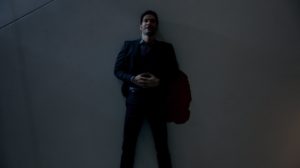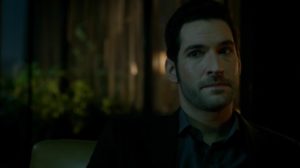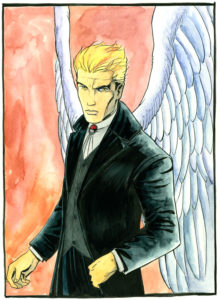“Take Me Back To Hell” was a run-of-the-mill episode of Lucifer, but the season finale managed to tear the heart from the Vertigo character the show is based upon.
Lucifer’s thirteenth episode begins with Amenadiel saving Lucifer—that is, removing him from the presence of Chloe and the other officers who were about to arrest the Devil at the end of the season’s penultimate episode. Beneath a gloomy sky, a rain-soaked Lucifer—fed up with humanity  and disappointment in Chloe, whom the Devil thought was altogether different from the rest—requests that Amenadiel return him to Hell. Amenadiel denies Lucifer’s request, as the angel sees now how selfishly he has behaved and feels the need to make things right.
and disappointment in Chloe, whom the Devil thought was altogether different from the rest—requests that Amenadiel return him to Hell. Amenadiel denies Lucifer’s request, as the angel sees now how selfishly he has behaved and feels the need to make things right.
Amusingly, the angelic brothers end up in a group therapy session with Dr. Linda Martin, who is irate with both of them, especially Amenadiel, who in a manipulative assault on Lucifer posed as a doctor and duped Linda into serving his scheme. Lucifer scorns Amenadiel as an “egotistical twit,” and Amenadiel castigates his brother in turn: “Luci, you’re arrogant, you’re selfish, all you do is think with your penis…” The two all-too-human angels are forced into an unlikely alliance by the kidnapping of Chloe’s daughter Trixie by Malcolm, the crooked cop back from the dead.
Chloe had seized the stolen cash Malcolm intended to use to purchase a new identity and flee the L.A. scene, and in response Malcolm resorted to kidnapping, demanding his money in exchange for Trixie’s life. Malcolm warns Chloe not to involve Lucifer, but the Devil is persistent, and Chloe ultimately puts her faith in the fallen angel, who enlists Amenadiel’s help in the search for Trixie. Amenadiel is mortally wounded by Malcolm—another erstwhile tool in the angel’s schemes against Lucifer—who managed to get his hands on one of Mazikeen’s demon daggers, which possess the power to injure immortals. Amenadiel’s life is ultimately saved by Mazikeen, who uses the remaining feather of Lucifer’s scorched angel wings—which, the demon explains, she thought could be used to get them back home to Hell—to heal Amenadiel, setting up for a major expansion of their newfound affections for one another.
 More significantly, Lucifer himself is mortally wounded, shot at pointblank range by Malcolm when vulnerable on account of Chloe’s proximity. Lying in a pool of blood, Lucifer directs his weary words heavenward, the wayward son of God calling out to his Father for help: “I don’t know if this is all part of the plan. Or if you can even hear me. But if you’re up there … Dad … I need a favor. I’ll be the son you always wanted me to be. I’ll do as you ask, go where you want me to. In exchange, all I ask is … is that you protect Chloe.” With that, Lucifer’s spirit transitions into the afterlife—into the threshold of Hell, portrayed as a bluish, ashy, urban setting. Lucifer notices the wide-open gate to Hell, and as he stares into the gateway in disbelief, he murmurs, “This isn’t possible.” Lucifer is then promptly brought back to life, his eyes glowing demonic red. The resurrected Devil successfully saves Chloe, who once and for all shoots Malcolm dead. The grimy villain lives long enough to see the Devil’s coin, which he planned to use to escape Hell, disintegrate into thin air.
More significantly, Lucifer himself is mortally wounded, shot at pointblank range by Malcolm when vulnerable on account of Chloe’s proximity. Lying in a pool of blood, Lucifer directs his weary words heavenward, the wayward son of God calling out to his Father for help: “I don’t know if this is all part of the plan. Or if you can even hear me. But if you’re up there … Dad … I need a favor. I’ll be the son you always wanted me to be. I’ll do as you ask, go where you want me to. In exchange, all I ask is … is that you protect Chloe.” With that, Lucifer’s spirit transitions into the afterlife—into the threshold of Hell, portrayed as a bluish, ashy, urban setting. Lucifer notices the wide-open gate to Hell, and as he stares into the gateway in disbelief, he murmurs, “This isn’t possible.” Lucifer is then promptly brought back to life, his eyes glowing demonic red. The resurrected Devil successfully saves Chloe, who once and for all shoots Malcolm dead. The grimy villain lives long enough to see the Devil’s coin, which he planned to use to escape Hell, disintegrate into thin air.
The final scene of Lucifer’s finale sets the stage for the series’ second season. Lucifer expresses to Amenadiel that he believes God wants him to stay on Earth to retrieve the one who escaped from Hell during Amenadiel’s incapacitation. Amenadiel notes that Lucifer, notoriously fearless, is somehow afraid. Amenadiel asks who escaped Hell, and the episode ends with Lucifer’s terse response: “Mum.”
As someone who read the Lucifer comic religiously, finding in Mike Carey’s character Lucifer Morningstar the Miltonic-Romantic Satan’s true heir, I feel I was exceedingly understanding when it came to the inevitable alterations the Lucifer show would for various reasons simply have to undergo. Vertigo’s Lucifer comic could revel in its irreverence, but Fox’s Lucifer show would understandably have to soften its sacrilegious aspects so as to avoid early cancelation (the very title of the show alone was destined to court controversy). Vertigo’s Lucifer comic could go wild with supernatural spectacle (a cigar chomping ex-cherub, a living tarot deck, angelic wars, alternate universes, a young girl assuming the Throne of God, etc.), but Fox’s Lucifer show would understandably be forced to downplay the heavenly and hellish elements by virtue of its limited budget (the Pilot episode is the only time Amenadiel flashes his angelic wings, for instance). Many fans of the Lucifer comic were irate by the time the show’s initial trailer was released, but I understood the multifaceted challenges of translating the fantastical Lucifer comic to the medium of television, and I was willing to play Devil’s advocate, hoping for the best. All I expected of Fox’s Lucifer was for it to stay true to the spirit of the characters, particularly the titular angelic anti-hero, of course. I simply cannot say that the creators of the Lucifer show either accomplished or even made an honest effort to accomplish this.
Lucifer showrunner Joe Henderson assured fans that he was “steering with the nerd cap on,” but Lucifer’s quasi deathbed repentance in “Take Me Back To Hell” is entirely antithetical to the spirit of the comic book character. When Lucifer at long last comes face-to-face with his Father Yahweh at the conclusion of Vertigo’s 75-issue Lucifer series, the Morningstar proudly reasserts his independence: “I’ve always been the one who said no to you, Father.”1 By the end of the first season of the Lucifer show, on the other hand, Lucifer pleads for his Father’s help and promises to “be the son you always wanted me to be” and to “do as you ask, go where you want me to.” That is not Lucifer, and it marks the show’s ultimate breakaway from its source material.

I noted from the beginning that while Mazikeen and Amenadiel were close enough to their comic counterparts, Lucifer was notably different, particularly his being rather adolescent and oversexed. (Amenadiel is right to accuse Lucifer of thinking only with his penis.) In an interview with TVLine, Henderson explained that the relationship between Chloe and Lucifer was “less about sex and more about emotion — which is ironic, because Lucifer kept trying to make it about sex! Lucifer thinks he can turn everything into a base desire, and Chloe is that thing that supersedes that, the person that challenges him.” This is a perfect example of how distant Lucifer is from his comic book counterpart, for Mike Carey’s Lucifer is motivated by anything but “base desire.” While Carey always emphasized that Lucifer is a son of God, Carey’s Lucifer was never childish, and he always possessed lofty existential aspirations, namely absolute autonomy. Fox’s Lucifer presented audiences with an extremely childish version of the fallen angel, who with each week drifted further away from his comic incarnation until the last traces of Carey’s Lucifer were submerged as the show had the titanic rebel against God beg for his Father’s help as he vows to amend his ways. Indeed, when Chloe remarks to the resurrected Lucifer, “I thought [Malcolm] killed you,” Lucifer’s response is undeniably an indirect indication of his having seen the light, as it were: “Oh, he did. I got better.” “Better” in the eyes of the creators of the Lucifer show, perhaps, but infinitely worse in the eyes of the fans of the Lucifer comic.
With Lucifer green-lit for a second season, I had hoped that the creators of the show would be emboldened to venture into territory closer to the comic. Season two of Lucifer may very well head in a more supernatural direction, but the revelation that Lucifer has a mother, who has escaped from the Underworld and is sure to raise Hell in Los Angeles throughout the show’s second season, underscores the fact that the Lucifer show has left the Lucifer comic far behind. The Devil having a mother not only has nothing to do with the world of the Vertigo Lucifer comic, but has nothing to do with the Judeo-Christian Devil’s biography whatsoever. While the writers of the show are surely enthusiastic about exploring Lucifer’s issues as the child of divorce or whatever the Hell they have in mind, I anticipate the presence of the Devil’s mom to only further infantilize Lucifer.
Notes
1. Mike Carey, Lucifer: Evensong (New York: DC Comics, 2007), p. 160.↩